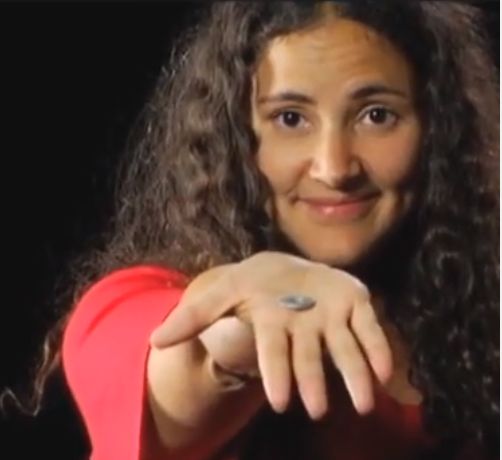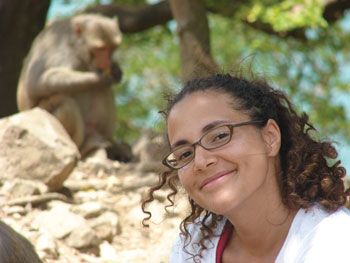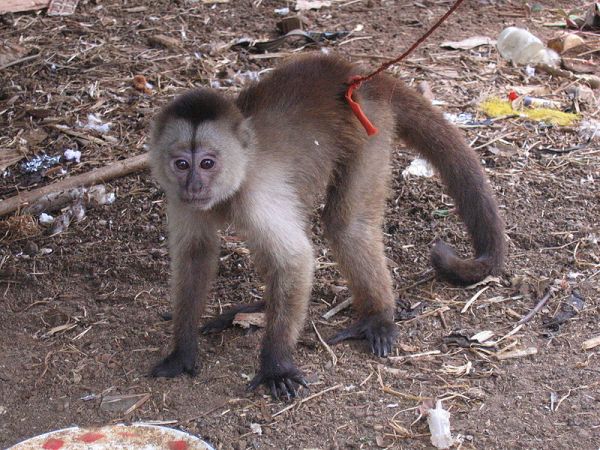Capuchins Learn to Spend Money
How
a Yale research team made history by teaching capuchins to spend money
... and discovered that they're just as smart—and stupid—as your
financial advisor.
It’s a little bigger than a quarter and
about twice as thick, but because it’s made of aluminum, it weighs
roughly the same. It’s flat and smooth, except for what seem to be a
few tiny bite marks around the perimeter. To you, it might look like a
washer without a hole. To Felix, an alpha male capuchin monkey, and his
friends at Yale University, it’s money.“When one of the monkeys grabs a token, he’s going to hold onto it as though he really values it,” explains Laurie Santos, a psychology professor at Yale. “And the other monkeys might try to take it away from him. Just like they would with a piece of food. Just as you might want to do when you see a person flaunting cash.”
During the past seven years, Santos and Yale economist Keith Chen have conducted a series of cutting-edge experiments in which Felix and seven other monkeys trade these discs for food much like we toss a $20 bill to a cashier at Taco Bell. And in doing so, these monkeys became the first nonhumans to use, well, money.
“It sounds like the setup to a bad joke,” says Chen. “A monkey walks into a room and finds a pile of coins, and he’s got to decide how much he wants to spend on apples, how much on oranges, and how much on pineapples.”
But the remarkable thing about the research isn’t that these monkeys have learned to trade objects for food—after all, a schnauzer can be taught to hand over your slippers in exchange for a Milk-Bone. The amazing part, Chen and Santos discovered, is how closely the economic behavior of these capuchins mimics that of human beings in all its glorious irrationality. Viewed in the context of the daisy chain of near-disastrous human failings that brought the world to the verge of fiscal collapse over the past few years, monkeynomics is eye-opening stuff.
So how much of our wild, dangerous economic behavior is hard-wired, and how much of it is learned? And most important, how much of it can be changed? Watching Felix and friends make financial decisions—some extremely smart, others profoundly dumb—provides groundbreaking insight into the roots of our own dysfunctional relationship with money. And why it all may have started 35 million years ago.
What kind of monkey would Santos be? “A bonobo,” she says with a laugh. “They’re kind of a hippie monkey.” With an infectious smile and curls that cascade down her back, the 35-year-old Santos exudes the cool prof vibe of someone who—all things being equal—would really rather be in a dorm, holding court about the meaning of life. “I’m fascinated by human beings, and monkeys are like humans in their purest form,” she says. She’s quick to offer a funny story about how she decided to pursue primate research after seeing a picture of the lush Caribbean island where the fieldwork was being done. But the truth is that her interest began with the idea that monkeys are like human beings without the cultural baggage.
As a Harvard undergraduate, Santos worked with behavioral scientist Marc Hauser and then signed on to do her dissertation based on research in his lab. Her work centered on basic questions of monkey cognition: How high can monkeys count? (To four.) Do they have a good sense of the practical physics of falling objects? (Not especially.)
This body of work earned her a tenure-track position at Yale, where in 2003 she was charged with setting up the school’s Comparative Cognition Lab. Santos chose capuchin monkeys for practical reasons. They’re smaller and easier to care for than chimps, but they’re almost as smart, resourceful, and social. She got 10 capuchins from noted researcher Frans de Waal at Emory University and planned to continue with the monkey cognition research that she had started at Harvard.
Then one day, one of the caretakers who cleaned the capuchin enclosures in the new lab told Santos that her monkeys were “geniuses.” Felix and friends, he explained with amazement, would hand him their discarded orange peels, trying to trade them for food. Maybe the monkeys were trying to make a point.




No comments:
Post a Comment